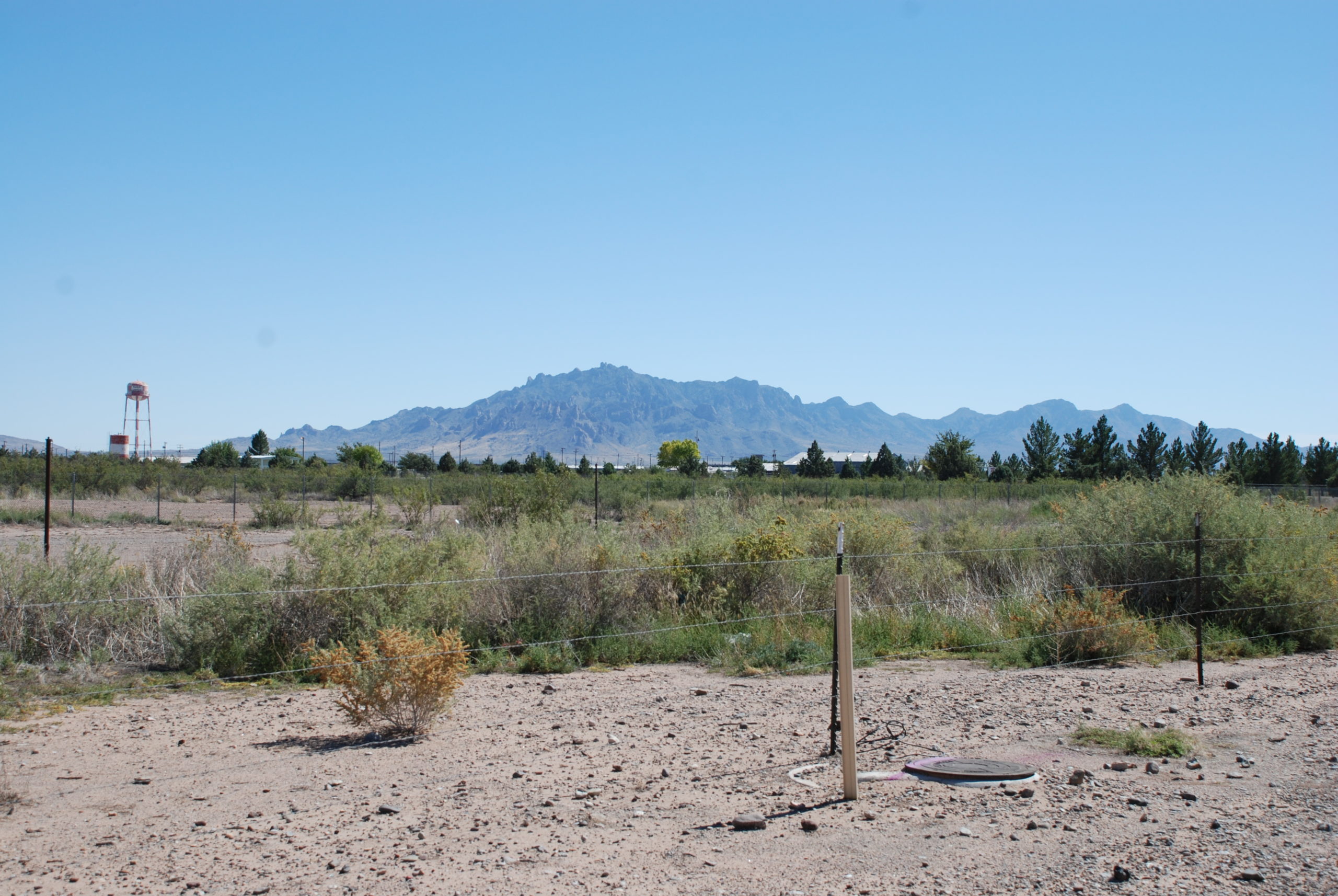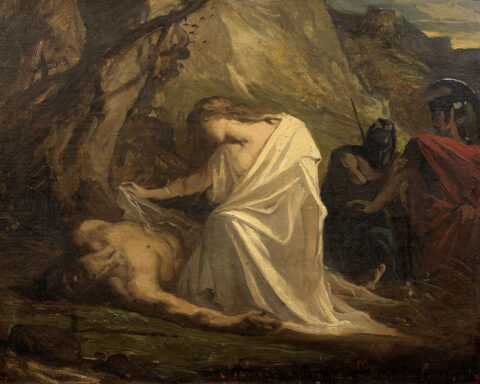Grandpa wears a sweatshirt the color of duct tape. It’s tucked into the heather-blue sweatpants he wore yesterday and the day before that. They ride high, revealing a band of skin above slouched white tube socks and black dress shoes with thick soles. I’ve convinced him that the only way I can drop the “thank you for your kindness during this difficult time” ad at the Deming Headlight office is if he picks me up and drives. Because he has left his house, he wears a hat, plaid tweed with a green feather, something between a fedora and Irish wool. His tan windbreaker seems too thin for the ashy clouds gathering above the Florida Mountains, their tops just visible from my parents’ cul de sac where he parks his little white pickup truck. Like always, he opens the door for me and walks around the back to the driver side door.
January is the ugliest month in Deming. Everything burnt charcoal, ash. Even my black hair is dull here, the ends coarse like the grass in my parents’ front yard. Just before Grandpa picked me up, I changed into the same faded jeans, gray turtleneck, and black fleece I wear on those rare occasions when I go out in public. My skirts and tights, heels, boots, and blouses with buttons and collars hang unused in the closet. Since I got here almost three months ago I’ve ironed only once, for my grandma’s funeral. These errands never take enough time, and too soon Grandpa will be back in his house alone, and I will be back in my parents’ house, wearing my younger brother’s cross-country sweats with their soft cotton lining and dried mud flaking off the foot holes.
We pass a trailer park where I used to sell Girl Scout cookies, walking up and down gravel streets named for dead white writers most of us had never read—Tennyson, Kipling, Emerson. I used to think these were the rich people, the old white ladies from somewhere else who came here for the altitude and mild weather. Snow birds with their paved roads, their neat yards of raked gravel, their porches carpeted in squares of astro turf held down by potted cactus, their welcome mats that looked brand new, and their groomed Chihuahuas, poodles, and weenie dogs that barked before I tapped on the screen door.
Grandpa’s Old Spice, heavier today than usual, fills the air between us in the truck. I crack my window and breathe in the clean cold, its sharpness the only part of winter in Deming that I like, the one thing fierce and alive in the midst of so much death.
We pass the t-ball fields and more trailers on Calle Juan and Calle Jaime, newer streets that look more like alleyways with lopsided mobile homes squeezed between cinderblock stilts and old tires holding down tarpaper roofs. A broken washing machine sits in a dirt yard. A boy and girl play in the bed of an abandoned truck.
Bell School, where my mom has been a teacher for more than twenty years, is a block building with chain basketball nets on the outdoor court and skinny maples lining the perimeter of the dirt playground. My dad was in the first class to attend this school, when the district moved all the brown kids from a rundown building with basement classrooms to a brand new school with shiny floors and white walls. Like Mexico City, it was built on sand and marsh. It sank into the ground and had to be rebuilt.
We pass Chicano Park, a triangle of dry grass with two concrete picnic tables and a metal slide too hot to touch in summer months.
“You think those clouds over the Floridas will give us some snow or rain?” I ask.
Since the new year, they only spit at us, dusting our windows and cars, but never soaking the ground.
“I don’t know, mi’ja. I don’t know anything since Grandma’s gone.”
I nod.
He’s right. We don’t know anything—how to make her red chile or that caldo de todo with whole Brussels sprouts, how to mix a Jack and Coke, how to grieve together. Since she died, it’s each of us in our own misery—my mom crying in the shower, me awake at night, wanting sleep, wanting to dream her, Grandpa in a dark house surrounded by the objects she touched, not allowing us to move anything.
We cut across gem streets, Diamond and Ruby, the St. Ann’s steeple rising above block houses on uneven ground. I’ve been holding the folder with our thank you ad and a ten-dollar bill paper-clipped to it. Grandpa pulls into the Deming Headlight parking lot, which never seems to have more than two cars. Once outside the truck, he sticks his hands into his pants and grabs the bottom of his sweatshirt. He pulls down until his arms are buried elbow deep and his clavicle is exposed just above his crewneck. As he pulls his hands out of his pants, careful not to dislodge the sweatshirt, he grabs the waistline of his sweats and pulls up, the way he might pull a blanket to his chest to sleep. I try not to stare at him, to give him this moment to right himself and feel comfortable in his clothes, if not his skin.
The Headlight office still has its wood-paneled walls and drop ceiling. The overweight sports writer, who always wore an extra-large T-shirt and biker shorts, is the editor now. The woman at the front desk tells me the ad will run in two days as she hands back my change.
“I want to stop at the Snappy Mart,” Grandpa says as we get back in the truck. “The Power Ball is thirty-eight million.”
Once a week, or more often when the jackpot is high, he buys one ticket for him, one for my mom, one for Grandma—which is really for him—and now that I am back, one for me.
“Sounds good, Grandpa.”
At the Snappy Mart, he fills the truck with gas and then drives us across the parking lot to a space a few steps from the door. Over the last several years, my grandma racked up more than forty thousand dollars in credit card debt. After she died, my mom started managing the bank account. With Grandpa’s veteran’s pension and social security, the house paid off, and the credit cards destroyed, my dad says they can knock out the debt in about eighteen months. Sooner, if one of us wins the Power Ball.
Tickets in hand, Grandpa gives me the truck keys and says, “You drive, mi’ja. Go through downtown, so you can see the new things.”
The old movie theatre is now Nena’s Fashions. I can’t imagine what it’s like inside or how Nena stays in business. The building next door was another clothing store where they sold factory second Levis. Our band director made a deal with the owners for a special rate on the white jeans we’d wear for casual gigs and jazz band. When it went out of business, there was a push by high school students and teachers to turn the building into a youth center. The City invested in a chain link fence to enclose a segment of the parking lot and installed basketball goals at opposite ends, one drilled right into the building, the other a portable unit that could be wheeled in at night. They claimed that further improvements weren’t in the budget. That was the same year they expanded the golf course from nine to eighteen holes.
“See the turn arrow, mi’ja?” Grandpa asks at the stoplight.
“Yeah, pretty fancy, Grandpa.” When I was growing up, Deming had two stoplights and one flashing four way stop on the south edge of town to slow down ranchers and cotton trucks coming in from the fields.
The hairdresser, office supply, and department store that once lined Gold Street are gone, replaced by an evangelical church and a Christian bookstore. The temperature on the electronic bank marquee reads forty-nine degrees.
SouthSide Market went under not long after Walmart opened for business. Planned Parenthood sat behind it, the front entrance facing the busiest street in town, the back facing Holy Family Catholic Church. When I was in high school, Deming had the highest teen pregnancy rate in New Mexico, which had the highest teen pregnancy rate in the country.
We pull into the mall parking lot. The mall is built of corrugated metal and has four storefronts, two of which are empty. Farmers Market will close by the end of the year, leaving only Family Dollar.
“Go to the handicapped, mi’ja,” Grandpa says, opening the glove compartment and pulling out his permit. He hangs it from the rearview mirror. I imagine a permit for our handicap—stick figure slouched in a corner, face half in shadow. Grandpa is a World War Two veteran with Post-Traumatic Stress Disorder, anxiety, and depression. I am a survivor of a car accident, a shitty relationship, and childhood sexual abuse, which seems to seep into everything, which I am tired of talking about, or maybe tired of who I’m talking to—therapist, other survivors, my journal, writers who write about sexual abuse. I’m tired of who I don’t talk to, what I keep from my family, and yet, the thought of bringing them into this story makes me even more tired. How to tend to them, how to keep from endless conversations about what happened and when and how, how to control the narrative. And so I keep this story to myself and let my family believe I am oversensitive and weak.
The Floridas stark blue shards cut into the clouds, spreading gray above and around us. Under this sky, the mountains seem taller, fertile, a place where streams could smooth and polish stones. But I know those mountains. The plants—yucca, ocotillo, prickly pear—hurt to touch, protecting themselves to survive drought, rattlesnakes, cattle, drunks, flash floods. Each of us deserves a set of thorns when the threat is great, or perhaps, like the locust tree, a spine that grows into a seedpod only when the branches are strong enough to survive, maybe thrive.
“Eight for three dollars. Better than the K-Mart, no?” my grandpa asks, gesturing toward the double A batteries labeled with a number three, big and red, like all the numbers at this store. “For the remote control in the bedroom.”
“Looks like a good deal, Grandpa,” I say, nodding and patting his shoulder.
He gets two packs from the rack and walks toward the checkout stand.
“You don’t need to go nowhere else, mi’ja?”
“No, Grandpa,” I say. “But you should come for dinner. Mom’s making enchiladas.”
“Oh…,” he says, eyeing the candy display in the checkout line.
“You’re not hungry?”
“I have chicken.”
“From where?”
“The Walmart.”
“Grandpa, that food isn’t made with love. Eat with us. Please. We want you to.”
“We’ll see,” he says, which really means no or I don’t want to or I’d rather go home and sleep.
“You don’t want a candy?” he asks. “I’ll get you a candy.”
“No thanks, Grandpa,” I say.
I should have said yes. I should have let my grandpa buy me a candy bar. I want to take it back, say, Yes, Grandpa, I’d love a candy. Candy would make me happy. But he’s put the batteries on the counter, and a couple is now behind us in line.
The man in front of us tilts a box of Sun laundry soap toward the checker so she can scan the price. He shakes his head when the checker reaches for a plastic bag. The man looks older than my grandpa, less cared for, made of dust.
The checker in her red smock hands him his change, and he leaves. He crosses the parking lot, then the street on foot, then vanishes into the line of cinderblock houses and chain link fences behind the Beverage Corner, where a guy I dated briefly in high school worked after his family got busted in an international drug smuggling operation, the largest bust in state history. They owned a beauty salon, a house south of town that sat on two acres of land enclosed by a six-foot concrete fence, and a champion race horse they housed in an air-conditioned horse stall north of town.
Grandpa hands the batteries to the checker and steps back from the register. He slides his hands down his pants, fists bulging against blue fleece as he grasps the bottom of the sweatshirt and pulls. I imagine the hem falling just above his knees like the nightshirts Grandma wore between hospital stays. He slides his forearms out from the sweatpants and pulls the waistband up again. There’s a thumbnail-sized rip at the crotch of his sweatpants.
My grandma would be embarrassed. She always had him looking so nice. My mom spends part of her weekends ironing trousers and collared shirts for him, but they hang untouched in his closet, across from my grandma’s clothes. I miss his sweaters, his Dockers. I miss the pristine mechanic coveralls he wore long after he closed his shop. He ties the white drawstring at mid-torso. It sticks straight out like a loop I might tug to lead him through the store or back to the truck or maybe into a life without my grandma, a life where he is useful, productive, like a man.




